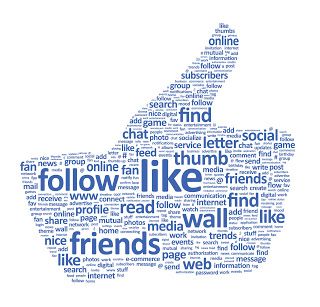Jealousy
Facebook: Lurking, Liking and Life Satisfaction
Lurkers on Facebook tend to feel worse about their lives than Likers do.
Posted February 2, 2013
Like, Don't Lurk Don't Lurk, Be Happy!

Like, Don't Lurk
Don't Lurk, Be Happy!
It seems that a lot more is going on socially on Facebook than meets the eye…or the status update. Some people are active users, posting vacation photos and links to videos and clicking “like” on their friends’ posts. Others are passive users who “lurk” invisibly behind the scenes, looking at what other people post, but rarely posting or even liking other posts. It turns out that this passive lurking may be bad for you. The latest research shows that lurkers are a lot less happy than likers on Facebook.
Social Media: Check Everyone Out
Media expert Marshall McLuhan said that we use media to extend our reach (1). Today, our social lives extend into cyberspace, inside online social networks like Facebook and Twitter. In fact: “Facebook (FB) represents the largest database of social information the world has ever witnessed.” (2)
There are 800 million Facebook users and 225 million Twitter users, making social networking a part of the fabric of our everyday lives. Collectively, we spend 700 billion minutes per month on Facebook and we’ve uploaded more than 100 billion photos there (3). Facebook is the most visited site on the Internet.(4)
Lurking: The Shadowland of Facebook
You may have noticed that Facebook activity has quite a range. Some friends post multiple times a day, updating you on their every mood and activity. Another friend may be the first to “like” anything someone posts. And then there are the silent types: the lurkers. These are the people who mention that they know all about your family vacation even though you haven’t discussed it with them and they never make a peep on your Facebook page.
Facebook Envy
It turns out that such lurkers should beware. A new study says that while Facebook activity may be a sort of combination of fun and boredom for many, it predicts problems for the lurkers. We may need to look out for Facebook envy in ourselves.
In a study of emotional experience on Facebook (4), researchers in Germany discovered that a lot of frustration people experience on the site comes from envy. And that envy is much more likely to happen to lurkers than to those who actively participate on Facebook. While active engagement on Facebook is linked to life satisfaction and social support, passive following is linked to lower life satisfaction. And the more intense the passive following, the greater harm it does.
What do people envy? Believe it or not, a common source of envy is travel and leisure. The researchers believe this is because people don’t often post images of their grand material possessions, but they do commonly post travel and leisure photos. People also commonly envied others for their social interactions and their happiness.
Is What We Envy Real?
If we envy people's lifestyles that they post about on Facebook, are we envying a lie? In other words, are we really who we say we are on Facebook? The answer seems to be: pretty much. In fact one study showed that we sort of can’t help but show who we really are on Facebook (5).
While we may think of Facebook profiles as ideals – more about who we’d really like to be than who we are-- and while we may be more likely to report good news than bad (4), somehow our real personalities end up coming through (5). Researchers in Germany and the US gave people personality tests designed to test their real and ideal personalities. They also asked friends to rate these friends’ personalities. Then research assistants perused these people’s Facebook pages and rated their personalities as well. Turns out, Facebook reflects more about your real personality than your ideal personality.
After all, it’s kind of hard to fake an image of yourself as a social butterfly when you never leave the house. Total strangers might not like it if you jump into their lap and snap a photo to post as your new profile pic. Plus, if someone asks whose lap you’re sitting on, you’ll have to make up a fake name-- like George Glass.
What does it all mean? For one thing, it means that social dynamics on Facebook do mirror real life dynamics. I suppose it also means that lurkers look like lurkers and likers look like likers. And, odds are that it’s better to like than to lurk.
References
(1) McLuhan, M. & Fiore, Q. (1968). The medium is the massage: An inventory of effects. New York: Bantam.
(2) http://thesocialskinny.com/100-social-media-statistics-for-2012/
(3) Pew Rearch Center (2012). The future of the internet. Washington DC: Pew Internet and American Life Project. Retreived April 1, 2012 from pewinternet.org.
(4) Krasnova, H., Wenninger, H., Widjaja, T., & Buxmann, P. (2013). Envy on Facebook: A Hidden Threat to Users’ Life Satisfaction?. In 11th International Conference on Wirtschaftsinformatik (WI), Leipzig, Germany
(5) Back, M. D., Stopfer, J. M., Vazire, S., Gaddis, S., Schmukle, S. C., Egloff, B., & Gosling, S. D. (2010). Facebook profiles reflect actual personality, not self-idealization. Psychological Science, 21(3), 372-374.




